Landscaping in Earls Court: Transforming Urban Spaces into Green Retreats
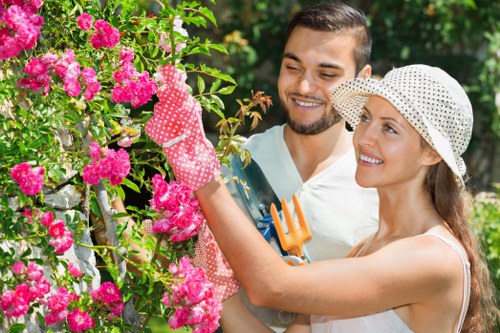
Introduction to Landscaping in Earls Court
Earls Court, a vibrant district in London, is renowned for its rich history, cultural diversity, and bustling urban life. Amidst the cityscape, **landscaping** plays a pivotal role in enhancing the aesthetic appeal and providing residents with serene green spaces. Whether you're a homeowner looking to revamp your garden or a business aiming to create an inviting exterior, understanding the nuances of landscaping in Earls Court is essential.
With limited outdoor space typical of urban environments, effective landscaping solutions must be both creative and functional. This article delves into the various aspects of landscaping in Earls Court, offering insights, tips, and inspiration for transforming your outdoor area into a beautiful, sustainable haven.
From selecting the right plants to optimizing space with innovative designs, **landscaping** in Earls Court requires a tailored approach that considers the local climate, soil conditions, and the unique architectural styles of the area. Let's explore the key elements that make landscaping in Earls Court both challenging and rewarding.
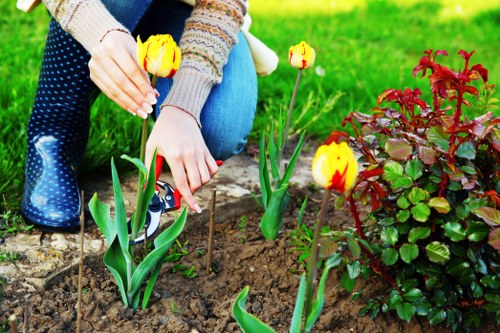
Choosing the Right Plants for Earls Court
Understanding the Climate
Earls Court experiences a temperate maritime climate, characterized by mild winters and cool summers. When selecting plants for landscaping in this area, it's crucial to choose species that can thrive in these conditions. Opting for native plants not only ensures better growth but also supports local biodiversity.
Some popular choices include:
- Lavender: Adds color and fragrance while attracting pollinators.
- Boxwood: Ideal for creating structured hedges and borders.
- Hydrangeas: Offer vibrant blooms and a lush appearance.
Incorporating a mix of perennials and annuals can provide year-round interest and adaptability to changing conditions.
Soil Preparation and Maintenance
Healthy soil is the foundation of any successful landscaping project. Conducting a soil test can help determine pH levels and nutrient content, allowing for appropriate amendments. Adding organic matter such as compost can improve soil structure, drainage, and fertility.
Regular maintenance, including mulching, watering, and pruning, is essential to keep plants healthy and prevent overgrowth. Implementing an efficient irrigation system ensures that your garden receives adequate moisture without wastage.
Additionally, using sustainable practices like rainwater harvesting and composting can reduce environmental impact and promote a greener lifestyle.
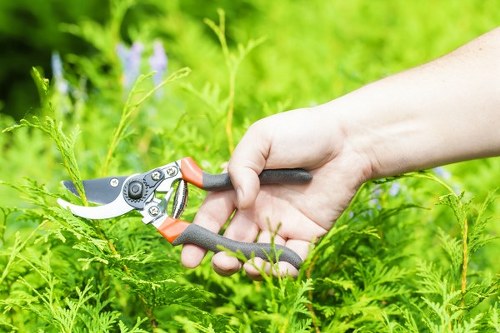
Maximizing Space with Innovative Designs
Vertical Gardening
In urban areas like Earls Court, space is often at a premium. **Vertical gardening** is an excellent solution for maximizing limited space while adding visual interest. Utilizing trellises, wall-mounted planters, and hanging baskets can create lush green walls and vibrant displays without occupying valuable ground space.
This approach not only enhances the aesthetic appeal but also contributes to improved air quality and insulation for nearby buildings. Selecting climbing plants such as ivy, climbing roses, and clematis can further enhance the beauty and functionality of vertical gardens.
Multi-Functional Outdoor Areas
Designing outdoor spaces that serve multiple purposes can optimize the usability of your garden. Combining seating areas with garden beds, incorporating outdoor lighting for evening ambiance, and integrating water features for a soothing effect are just a few ways to create versatile spaces.
Consider adding retractable awnings or pergolas to provide shade during the day and shelter at night. This flexibility allows your garden to be enjoyed throughout the year, regardless of weather conditions.
Utilizing Container Gardening
Container gardening offers flexibility and creativity, especially in small spaces. Using a variety of pots, planters, and hanging baskets allows for easy rearrangement and experimentation with different plant combinations. This method is ideal for those who may frequently move or prefer a dynamic garden setup.
Moreover, container gardens are perfect for growing herbs, vegetables, and flowers, providing both aesthetic and functional benefits. Selecting containers with proper drainage and using high-quality potting mix ensures healthy plant growth and longevity.
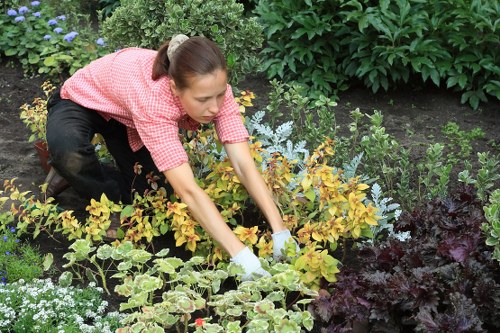
Incorporating Sustainable Practices
Eco-Friendly Materials
Sustainability is a key consideration in modern landscaping. Choosing eco-friendly materials such as reclaimed wood, recycled metal, and natural stone reduces environmental impact and adds unique character to your garden. These materials are not only durable but also blend seamlessly with the natural surroundings.
Additionally, using permeable paving solutions helps manage stormwater runoff, preventing flooding and erosion while promoting groundwater recharge. Incorporating green roofs and walls can further enhance the sustainability of your outdoor spaces.
Water Conservation
Water conservation is crucial, especially in urban settings where water resources may be limited. Implementing efficient irrigation systems such as drip irrigation and smart timers ensures that plants receive the necessary moisture without excessive usage.
Planting drought-tolerant species and creating shaded areas can also reduce water requirements. Collecting rainwater for irrigation and using greywater systems are effective ways to minimize water waste and support a sustainable garden.
Composting and Soil Health
Maintaining healthy soil through composting is an integral part of sustainable landscaping. Compost enriches the soil with essential nutrients, improves structure, and supports beneficial microbial activity. Setting up a compost bin or using a worm farm can recycle organic waste and provide a continuous supply of natural fertilizer.
Healthy soil reduces the need for chemical fertilizers and pesticides, promoting a more environmentally friendly and resilient garden ecosystem.
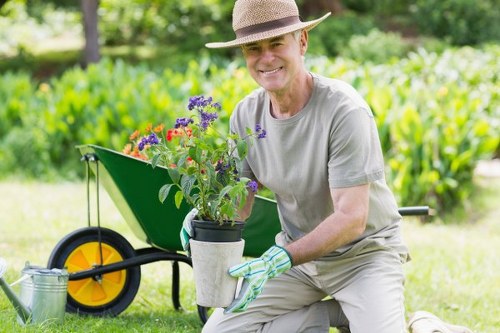
Professional Landscaping Services in Earls Court
Benefits of Hiring Experts
While DIY landscaping projects can be fulfilling, professional landscaping services offer expertise, efficiency, and a polished finish. Experienced landscapers understand the local climate, soil conditions, and design trends, ensuring that your garden is both beautiful and sustainable.
Professionals can assist with every aspect of landscaping, from initial design and plant selection to installation and ongoing maintenance. Their knowledge and skills can help avoid common pitfalls, ensuring a smooth and successful transformation of your outdoor space.
Customized Landscaping Solutions
Every garden is unique, and tailored landscaping solutions are essential to meet individual needs and preferences. Professionals work closely with clients to understand their vision, lifestyle, and budget, creating customized plans that reflect their personal style and functional requirements.
From modern minimalist gardens to traditional English landscapes, the possibilities are endless. Customized solutions ensure that your garden is a true reflection of your personality and complements the architectural style of your home or business.
Maintenance and Upkeep
Ongoing maintenance is vital to preserve the beauty and health of your garden. Professional landscaping services offer regular maintenance packages, including pruning, mowing, fertilizing, and pest control. This ensures that your garden remains vibrant and well-kept throughout the year.
Additionally, professionals can provide seasonal advice and implement necessary adjustments to accommodate changing weather conditions and plant growth cycles.

Enhancing Curb Appeal
Front Garden Design
Your front garden is the first impression visitors have of your property. A well-designed front garden can significantly enhance curb appeal and increase property value. Incorporating a mix of **evergreen** and **seasonal plants**, along with strategically placed lighting and pathways, creates an inviting and attractive entrance.
Consider adding focal points such as a water feature, a sculpture, or a unique seating area to draw attention and add character. Mulching pathways and planting colorful flowers can also make your front garden stand out.
Outdoor Lighting
Proper outdoor lighting not only highlights the beauty of your garden but also provides safety and security. Using a combination of ambient, task, and accent lighting can create a well-lit and inviting outdoor space.
Solar-powered lights are an eco-friendly option, offering energy efficiency and ease of installation. LED lights provide longevity and vibrant illumination, enhancing the nighttime appeal of your garden.
Seasonal Planting
Incorporating seasonal planting ensures that your garden remains vibrant and colorful throughout the year. Planting bulbs in the fall for spring blooms, colorful annuals in the summer, and sturdy perennials in the winter can maintain visual interest across all seasons.
Planning for seasonal changes also involves selecting plants that can withstand local climate variations and ensuring proper care during different times of the year.

Creating Functional Outdoor Spaces
Patios and Seating Areas
Patios provide a versatile space for relaxation, dining, and social gatherings. Designing functional seating areas with comfortable furniture, shade structures, and ambient lighting can create an inviting outdoor living space.
Materials such as natural stone, pavers, and composite decking offer durability and aesthetic appeal. Incorporating features like fire pits or outdoor heaters extends the usability of patios into cooler months.
Vegetable and Herb Gardens
Growing your own vegetables and herbs is both rewarding and sustainable. Integrating raised beds, container gardens, or vertical planters can optimize space and make gardening more accessible.
Choosing a variety of vegetables and herbs not only provides fresh produce but also adds greenery and texture to your garden. Proper planning and maintenance ensure a bountiful and thriving garden.
Play Areas for Children
Creating safe and engaging play areas for children promotes outdoor activity and fosters a love for nature. Incorporating features such as playsets, sandboxes, and soft ground surfaces provides a fun and secure environment.
Designing with safety in mind involves using non-toxic materials, ensuring proper installation of equipment, and maintaining a clutter-free space.

Sustainable Landscaping Practices
Native Plant Integration
Integrating native plants into your garden supports local wildlife and reduces the need for excessive watering and maintenance. Native species are well-adapted to the local climate and soil conditions, ensuring resilience and longevity.
They provide essential habitats for pollinators, birds, and beneficial insects, contributing to a balanced and thriving ecosystem.
Reducing Carbon Footprint
Sustainable landscaping practices help reduce your carbon footprint and promote environmental stewardship. Planting trees and shrubs sequesters carbon dioxide, while reducing energy consumption through natural shading and windbreaks.
Using eco-friendly materials and minimizing chemical usage further support a sustainable and eco-conscious garden.
Composting and Waste Reduction
Composting organic waste not only reduces landfill emissions but also enriches the soil with valuable nutrients. Setting up a compost bin or utilizing community composting programs can effectively manage garden and household waste.
Reducing waste through recycling and reusing materials in your landscaping projects fosters a more sustainable and responsible approach to gardening.

Trends in Landscaping for Earls Court
Minimalist Garden Design
The minimalist garden trend emphasizes simplicity, clean lines, and uncluttered spaces. Utilizing a limited color palette, geometric shapes, and carefully selected plant varieties creates a serene and modern aesthetic.
Incorporating elements such as gravel pathways, sleek furniture, and minimalistic water features aligns with this trend, providing a stylish and low-maintenance garden.
Smart Irrigation Systems
Advancements in technology have led to the development of smart irrigation systems that optimize water usage and enhance garden health. These systems use sensors and automated controls to adjust watering schedules based on weather conditions and soil moisture levels.
Smart irrigation not only conserves water but also ensures that plants receive the right amount of moisture, reducing the risk of overwatering or underwatering.
Biophilic Design
Biophilic design focuses on creating a strong connection between humans and nature within built environments. This approach incorporates natural elements such as plants, water features, and natural materials to enhance well-being and productivity.
Incorporating biophilic principles into your landscaping can create a harmonious and inviting outdoor space that promotes relaxation and connection with nature.

Final Thoughts on Landscaping in Earls Court
Landscaping in Earls Court offers a unique opportunity to blend urban living with natural beauty. By carefully selecting plants, optimizing space with innovative designs, and embracing sustainable practices, you can create a garden that is both functional and aesthetically pleasing.
Whether you're enhancing curb appeal, creating a functional outdoor space, or supporting environmental sustainability, thoughtful landscaping can transform your Earls Court property into a green retreat that you can enjoy year-round.
Ready to transform your outdoor space? Contact us today and let our expert team help you design and implement the perfect landscaping solution for your Earls Court home or business.
